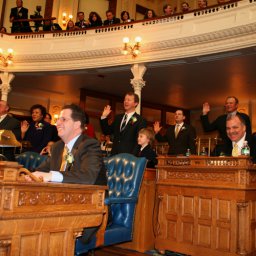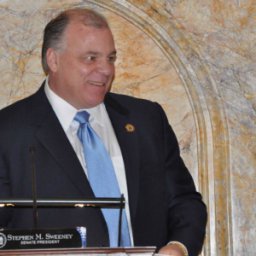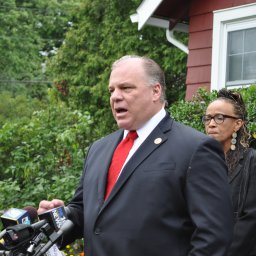Measures Would Protect Retirements of Rank-And-File Public Employees, Require Government to Meet Its Obligations
TRENTON – A bipartisan package of legislation that would complete the unfinished business of reforming the state’s public employee pension and benefits system first begun nearly four years ago was today unanimously released by the Senate State Government, Wagering, Tourism & Historic Preservation Committee.
The four bills would return the pension and benefits system to its original goal of ensuring the retirements of rank-and-file public employees and constitutionally require government to meet its annual pension obligations.
Senate President Stephen M. Sweeney already has posted three of the bills for votes during Monday’s Senate session. The constitutional amendment will require a public hearing before it can be posted for a final vote.
“These reforms are necessary to restore New Jersey’s long-term fiscal footing and return sanity to a pension and benefits system that was allowed to spiral out of control,” said Sweeney (D-Gloucester/Cumberland/Salem). “They were conceived in the spirit of bipartisanship, and I believe they will pass in bipartisan fashion as well.”
According to published reports, the various state pension plans are underfunded by at least $30 billion after years of skipped or partial payments.
The bills seek to enact recommendations from the 2006 Special Session on Property Tax Reform’s Joint Legislative Committee on Pension and Benefits Reform. That committee made 41 proposals for overhauling the public pension and benefits system to ensure its long-term viability for career state employees. Fifteen recommendations were enacted legislatively; other reforms were achieved through collective bargaining.
The first bill (S-2) – sponsored by Senators Nicholas P. Scutari and Kevin O’Toole – would limit enrollment in the defined-benefit pension system to full-time employees who work at least 35 hours per week at the state level or 32 hours in local government and public schools. All other new employees earning at least $5,000 annually could enroll in a 401(k)-style defined contribution plan. Current employees with fewer than 10 years of service would be allowed to switch from the defined-benefit plan to the defined-contribution plan, or withdraw from the system altogether.
The bill also would reconfigure the equation used to calculate pension benefits for future employees by dividing the number of years worked by 60, rather than the current 55. Also, the number of “high salary” years used for calculating benefits for workers in the public employee and teacher pension systems would be raised to five years from the current three; enrollees in the police, fire and State Police systems would have their pensions based on their highest three years – up from the current one-year standard.
The bill also would designate a “one job-one pension” rule for multiple job holders, with only the highest-salaried position counting towards a pension.
Both Scutari and O’Toole served on the pensions and benefits panel during the special session – Scutari was co-chairman; O’Toole was the Assembly’s Republican representative.
“If we are ever to repair this broken system, we must take a realistic approach to defining pension and benefit parameters,” said Scutari (D-Union/Middlesex/Somerset). “Past actions to boost pensions only increased the unfunded liability, placing at risk the retirement of career employees. Reform is vital to ensuring workers get the benefits promised and taxpayers are not left to shoulder excessive costs.”
“These common sense solutions are based on the findings of a bipartisan panel that spent the entire summer of 2006 taking testimony on the pension crisis,” said O’Toole (R-Essex/ Bergen/Passaic). “This is a good first step toward making our pension system a reward for dedicated service by career public employees, not a perk for the politically connected. These changes will bring employee benefits more in line with what taxpayers reasonably can be expected to pay.”
A second measure (S-3) would require all current public employees – state, school district, and local – to pay at least at least 1.5 percent of their salary towards their health benefits after the expiration of their current contract, and would require all newly-hired employees to pay at least 1.5 percent of their base pension toward health benefits upon retirement.
State employees would be required to work at least 35 hours per week to qualify for health benefits, with local and school employees having to meet a minimum 25-hour-per-week standard.
The bill is sponsored by Senators Michael Doherty and Jim Whelan.
“Taxpayers simply can’t afford to pay ever-increasing public employee insurance costs when many of them don’t have health coverage or even a job,” said Doherty (R-Warren/Hunterdon). “It’s just not fair that government workers, especially well-compensated employees, don’t pay part of health premiums when private sector workers of all earnings levels must do so.”
“All public employees should be treated fairly, especially when it comes to health care,” said Whelan (D-Atlantic), chairman of the state government panel. “But, our overburdened benefits system threatens to leave future workers with no affordable health coverage at all. We must ensure a viable system for tomorrow’s public employees.”
Senator O’Toole and Majority Leader Buono are sponsoring a measure (S-4) to limit sick leave payouts for all new local and school employees to $15,000 – the standard currently in law for state employees. The bill also would allow new local government and school employees to carry over only one year’s worth of vacation year-to-year and would eliminate the current sick leave injury program.
“There cannot continue to be two standards, especially when we have already seen the golden parachutes some school employees have been able to construct for themselves by taking advantage of the current system of uncapped sick leave buyouts,” said Senate Buono (D-Middlesex). “Local taxpayers should not be left on the hook for something we already have taken care of at the state level.”
Finally, a proposed constitutional amendment (SCR-1) would require the state to annually meet its obligation for each pension plan it operates.
If approved by voters in the November General Election, the state would have seven years beginning with the 2012 fiscal year to catch up to its full obligation – starting with Fiscal Year 2019, the full payment would be required every year. It is sponsored by Senate President Sweeney and Republican Leader Tom Kean.
“New Jersey has made a promise of retirement security to its hundreds of thousands of public sector employees,” said Kean (R-Union/Essex/Morris/Somerset). “The legislation I am co-sponsoring requires the state to put away the money needed to keep its promises.”
Each of the reforms has at least 23 Senate sponsors – more than the threshold for passage in the full Senate.




